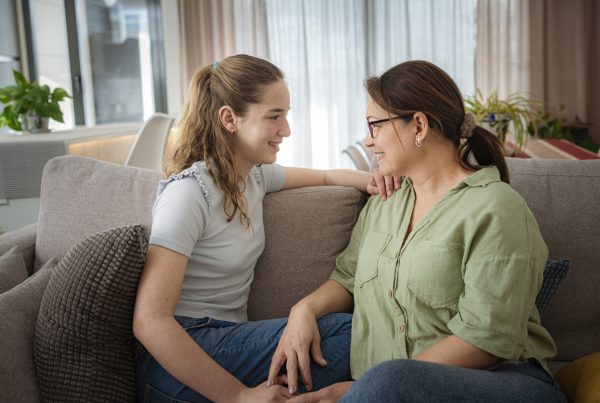When the printing press made books available to the general public at an unprecedented rate, generations of children had their bad manners and poor habits blamed on time spent burrowed between pages rather than household chores. When television took over every household in the developed world, spoiled behavior and dropping grades were blamed on too much TV. Now, we live in the Internet and social media age – but does that mean it’s the same story, with different characters?
Not necessarily. While it’s true that smartphones and social media make a convenient scapegoat for the same generational gripes that have existed since the days of ancient Greece, we have more to go on these days than public opinion and the words of a famous philosopher.
Teenagers are at risk of developing mental health issues due to mobile phone usage. In this article, we’re taking a closer look at one of the most common questions we hear from parents – does social media affect teen mental health?
How Does Social Media Affect Teen Mental Health?
Research shows us that there are more direct links between the long-term chronic use of social media and poorer teenage mental health – even when that research is being funded by companies that have a vested interest in the exact opposite findings.
Yes, correlation is not the same thing as causation, and while it’s true that smartphones, likes, and retweets can elicit feelings of “addictive” joy through dopamine dumps, the same goes for any enjoyable activity – whether it’s reading a thriller novel, going to the movies, or sitting on the sidelines of a major sporting event.
But there are a few unique things about social media that make it a serious concern for today’s youth and the youth of the near future.
So, how does social media affect teen mental health?
Social Media and Self-Image
Social media refers to any platform that caters to a network of individuals and encourages people to connect to each other via online accounts. Most social media platforms encourage using real names, locations, and personal details, and very few ask users to stay anonymous for their safety.
Social media is unlike anything we’ve seen before. It is constant. It is pervasive. And for billions of people worldwide, it plays a significant role in their daily lives.
Social media is more than radio or television – it is a second life, a life on the internet, or a lens through which others can voyeuristically view your real life in bite-sized, curated, unfiltered, raw moments screencaps. It affects a person’s self-worth and self-image, especially among adolescents.
Nevertheless, many teens are smart enough not to post everything online. Instead, they take a number of different approaches to online social networking.
- The first is the typical curated account. This is more of a social portfolio – a look into a version of themselves that teens carefully cultivate and edit to evoke a certain aesthetic, appeal to a certain group of peers or fit into a clique. These accounts are, for all intents and purposes, networking tools.
- The second is the private account or the finsta. Sometimes these second accounts are secret and reserved for close friends or an inner circle. They’re like a digitally-hosted communal album experience – one part of a larger social collage created by a group of friends.
- The third is the anonymous account. This could be a meme page, a gimmick account, or any other anonymous account created for posting jokes, sharing content, or creating a community online.
Regardless of what kind of account a teen runs – and teens often have multiple accounts on the same platform for this very reason – these accounts can change a teen’s self-image for better or worse.
A curated profile can help teens boost their self-confidence by choosing how they present themselves to the world around them. But this has the downside of causing teens to prefer the “filtered” version of themselves while perhaps resenting how they really see themselves.
For teens with existing mental health issues, the dangers of putting oneself “on display,” even if it’s a curated digital analog, can be myriad.
Social Media and the Erosion of Privacy
Even while curating the content, they create, teens keep less and less of themselves to themselves nowadays. There is an expectation of candid honesty, a societal pressure between teens and influencers to present a “day in the life of” for every teen who wishes to be accepted, let alone popular.
Teens growing up in a post-Patriot Act would have a very different expectation of privacy, to begin with. Still, Internet culture’s shift away from anonymous posters to constant, infinite interconnectivity and online social influence has built a culture of oversharing.
Even ten years ago, surveys showed that as many as 77 percent of teens were at risk for identity theft due to the amount of information they published about themselves. Ten years is a long time in the Internet age, and things have only worsened.
Whether it’s public chatrooms, daily TikTok posts, or hourly Tweets about college life, teens are leaving more and more of themselves for the rest of the world to watch and participate in – not just ephemerally but as a permanent record. We’ve already seen real-life examples of people suffering career consequences for the thoughtless ramblings they had as teens on Facebook and Twitter.
Not only are the consequences of a lack of privacy immense, but they can carry a mental toll. More and more teens are victims of cyberbullying and place great weight and importance on their popularity on social media platforms. Some of the other long-term mental health consequences of social media overuse include:
- Higher risk of eating disorders
- Higher risk of suicidal thoughts
- Risk of depression
- Greater levels of anxiety
- Poorer sleep due to excessive screen time
- And more.
Is Social Media Bad For Teens?
Some research points directly at social media as a potential cause for teen ills. Other research is inconclusive. If we want to draw our own conclusions, we can pick social media – especially the overuse of social media – as a scapegoat for teen problems.
But social media is often just one part of a bigger problem.
Teens today are growing up in a world still shaken by a global pandemic, facing the looming threat of global warming and other societal issues. In addition to these pressures, teens still worry mostly about the same things as ever, such as whether their crush likes them, getting good grades, making their parents proud, and picking the right career path.
Teens spend a lot of time in front of their screens. But they also smoke less, drink less, do fewer drugs, and have sex at a later age. While many teens struggle with adulthood, that’s nothing new – and millions upon millions of American teens continue to enter the workforce every year.
Social media has a definite negative impact on many teens, especially those already susceptible to self-image issues and depression.
It can make them feel like they aren’t living up to the fake standards set by their peers or by popular influencers, the same way fashion magazines and advertisements have made women feel self-conscious about their weight for decades.
Excessive screen time among teens is also linked to poorer sleep, less than recommended physical activity levels, and a worse mental state.
But social media can have its benefits. It allows friends to stay friends across state lines and even national borders. It gives teens access to greater information, provided they are taught to be media literate. And regardless of whether parents agree with it, social media is a crucial part of social life in the modern world. It can become actively harder to interact, network, and communicate with your peers without an account on Facebook, Instagram, or Twitter.
Rather than taking your teen off the internet, help them navigate it more safely, with respect to their own privacy and with respect to the dangers of being excessively online.








